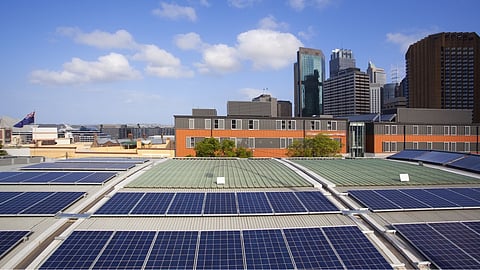

Sydney has the technical potential to generate up to 21 GW of renewable energy, especially rooftop solar
Coupled with storage systems, rooftop solar can help the city meet 75% of its annual electricity needs
Some industrial zones can generate massive amounts of clean electricity to share with nearby residential areas
If every rooftop across metropolitan Sydney – residential, commercial, and industrial – were equipped with solar panels, the city could generate up to 21 GW of renewable energy. With battery storage, it could cover as much as 75% of its annual electricity needs, according to a new report by local think tank Committee for Sydney.
At present, metropolitan Sydney generates over 3 GW from rooftop solar capacity, covering 10% to 12% of its total electricity demand. Of this, 76% is generated by the residential segment, and another 20% from industrial installations.
Rooftop solar and storage can help industrial estates produce between 500% and 1000% of their energy requirements. This excess electricity can then be used to power nearby residential areas, according to the report titled Sydney As a Renewable Energy Zone.
While full deployment may not be feasible due to shading, structural, and other limitations, the untapped potential remains a powerful opportunity for urban energy transformation, points out the report.
Among the key barriers outlined are inequality between resources available for owner-occupied properties and the rest, which includes renters, tenants, apartment dwellers, low-income households, and smaller businesses.
Limited regulatory innovation, lack of the right digital infrastructure in the form of smart meters, virtual power plants (VPP), etc., and the lack of social acceptance regarding its benefits are some of the challenges.
As New South Wales (NSW) gets ready for the time when the state’s last coal unit closes by 2038, it needs to urgently boost clean energy to meet growing demands from the population, homes, businesses, and transport.
“The new report makes six key recommendations, including mandating solar on new buildings, improving access to household and community batteries, and using more industrial rooftops to share power with households that can't access solar - so everyone can benefit from cheaper energy bills,” states the organization.
The complete report by the Committee for Sydney is available on its website for free download.
Sydney had earlier signed an agreement with Flow Power to source 100% renewable energy for the entire city to come from wind and solar power by 2030 (see Sydney Commits To 100% Renewable Energy).
